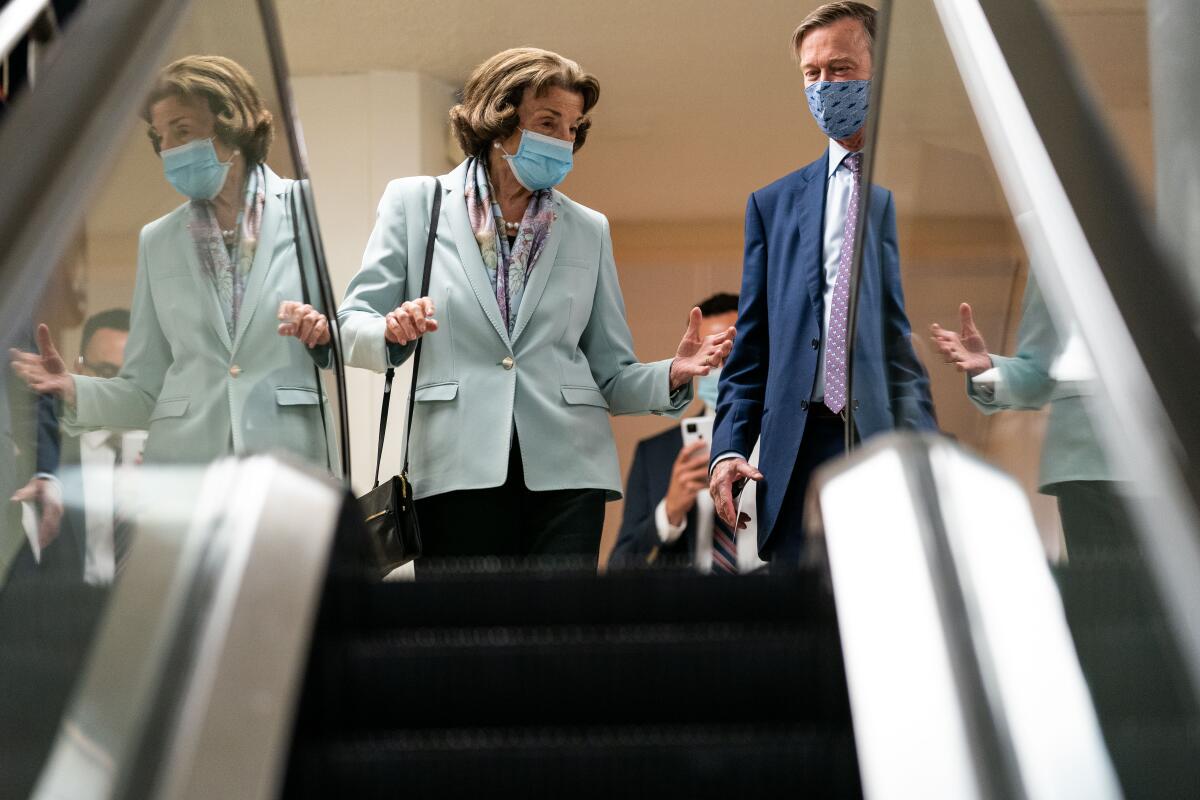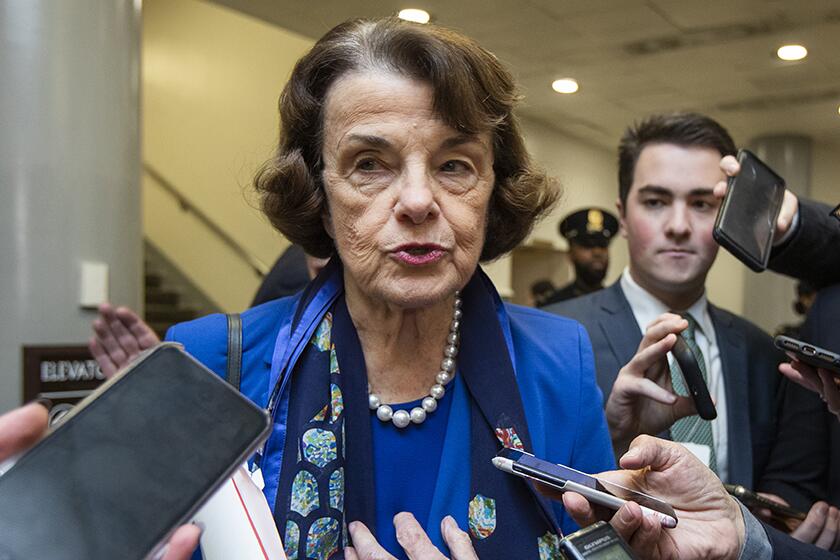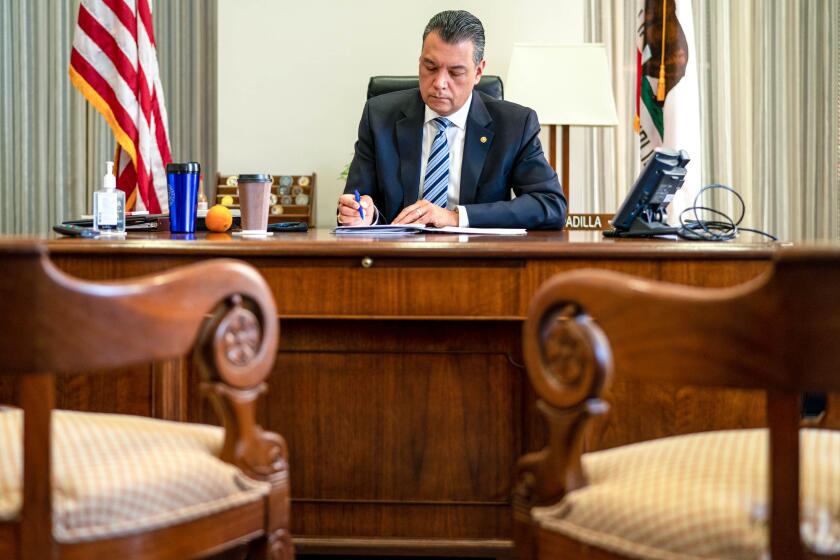Amid clamor for Sen. Dianne Feinstein to quit, California has no great options

- Share via
In a perfect world, the sun would always shine — except when we needed rain.
Everyone would eat their vegetables, clean up after their pet, regularly brush and floss, and cross the street only when the signal allows.
Which brings us once more, in a roundabout way, to Sen. Dianne Feinstein and the recent report in the San Francisco Chronicle raising doubts about the California Democrat’s mental well-being and capacity to keep doing her job.
California faces a choice between a geriatric senator who some describe as half gone and a younger senator who would be gone half the time.
Not great options. But there you have it.
Ideally, Feinstein would still be the force she once was: the history-making political pioneer who shattered glass ceilings and became an accomplished lawmaker whose record includes major environmental and gun control legislation.
Alternatively, Feinstein would have bowed to age and its toll and stepped aside rather than seek reelection in 2018. That would have allowed one or more of the state’s many would-be U.S. senators to step up and make their case to voters on why they deserved to take her place.
That whole representative democracy thing.
History will be a lot kinder to Sen. Dianne Feinstein than today’s dismal approval polls.
Instead, California has a senator turning 89 in June, who, like many her age, experiences good and bad days. Some of them, apparently, very bad.
The Chronicle’s Tal Kopan and Joe Garofoli reported last week that four senators — including three fellow Democrats — and a Democratic House member said Feinstein’s memory was rapidly deteriorating and she could no longer fulfill her duties without aides doing much of her work. Several ex-staffers agreed.
The article renewed calls for Feinstein’s immediate resignation, even though she continues to work on legislation, tend to constituent needs, and as recently as last month appeared lucid and perfectly capable, as she was during the Supreme Court confirmation hearings for Ketanji Brown Jackson.
“The real question is whether I’m still an effective representative for 40 million Californians, and the record shows that I am,” Feinstein said in a statement responding to the Chronicle, her hometown newspaper.
“While I have focused for much of the past year on my husband’s health and ultimate passing, I have remained committed to achieving results and I’d put my record up against anyone’s,” she added.
To be clear: There is no question that when or if Feinstein can no longer execute her responsibilities as senator, she should resign without delay. (Catch that italicized emphasis?)
A Senate seat is not a birthright, a lifetime appointment or an achievement award presented like a gold watch for meritorious service.
It was sad and shameful watching South Carolina Republican Strom Thurmond serve in the Senate — using the word “serve” in a most generous fashion — until he was 100, then seeing the ailing West Virginia Democrat Bob Byrd desperately cling to his seat until he died in office at age 92.
That said, if Feinstein were to quit now, her replacement would be chosen by Gov. Gavin Newsom, who has already appointed California’s junior U.S. senator, Alex Padilla.
That would mean one individual selecting both U.S. senators on behalf of 40 million Californians.
Newsom’s pick would then almost certainly spend much of the time between now and the November 2024 election campaigning and raising the tens of millions dollars needed to win a full six-year term.
Even someone with a ton of youthful energy would find it exceedingly difficult to do that and be a full-time senator.
California’s freshman U.S. senator, Alex Padilla, says the last year has meant a lot of adjustment — and a regular 4,600-mile roundtrip commute.
It is not as though Feinstein’s age and health weren’t issues when she sought reelection at age 85. Her chief rival at the time, former state Senate leader Kevin de León, pledged to bring “fresh” leadership to Washington, which was not a terribly subtle way of pointing out the incumbent’s elderly vintage.
As Feinstein campaigned, it was clear she had lost more than a few steps. Speaking in the Bay Area to a large gathering of Democratic activists a month before the election, the senator seemed heavily scripted and controlled by staff, and leaned on others to answer questions during a limited give-and-take, several in attendance noted afterward.
Still, Feinstein won a clear-cut victory.
There have been numerous accounts since of her failing memory and receding faculties, invariably followed by calls for her to step down. (Much of the agitation has come from the far left, a foe of Feinstein going back decades to her time as San Francisco’s mayor.)
Is her condition getting worse? That would take an expert to say, and there is no system for testing senators’ mental acuity, much less for forcing them from office if they fail to meet a certain threshold.
Maybe in a more perfect world.
Barring the senator’s obvious incapacity, one individual shouldn’t have the power to pick California’s two senators.
Whoever wants to replace Feinstein could start running now, the way Marin County Rep. Barbara Boxer set out in 1992 to challenge Sen. Alan Cranston. Instead of facing his fellow Democrat and other primary opponents, Cranston served out his term and retired.
If, foolishly, Feinstein decides to run again in 2024, there will doubtless be plenty of candidates eager to take her on. Then voters can be the ones to choose California’s next senator.
More to Read
Get the latest from Mark Z. Barabak
Focusing on politics out West, from the Golden Gate to the U.S. Capitol.
You may occasionally receive promotional content from the Los Angeles Times.













